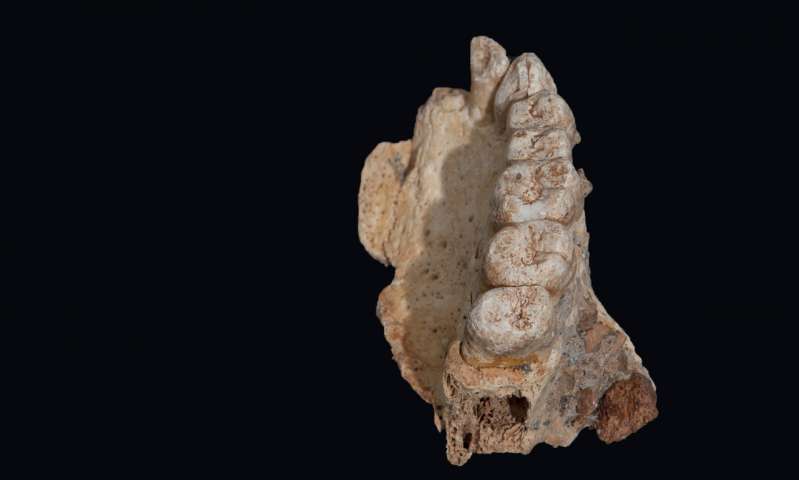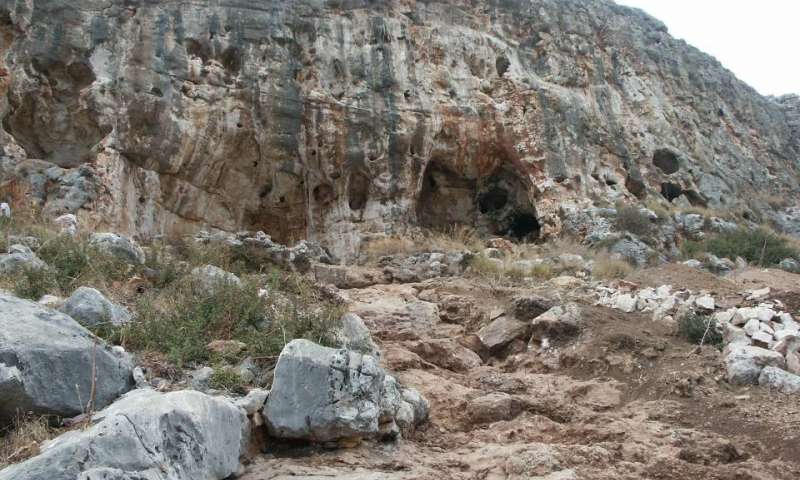At https://phys.org/print436100309.html … various people sent in links to the same story. William fowarded the link https://www.yahoo.com/news/oldest-modern-human-found-ever-190004346.html … an international team led by Israel Hershkovitz from Tel Aviv University have discovered the earliest 'modern human' fossil ever found outside of Afriica. It mentions modern humans must have left Africa much earlier than previously thought. It also means that modern humans wee probably meeting and interacting with archaic humans – providing apportunities for cultural and biological exchanges. For the moment we may note this idea of an early modern human dispersal is not following the genetic research songsheet where the idea of a 60,000 years ago dispersal is still ruling the roost (unable to embrace the idea of a bottleneck causing genetic obstructions around 40,000 years ago). More on this on the morrow.
The fossil consists of an upper jawbone with several intact teeth (which is more substantial than the single tooth that launched the Denisovan storyline) …
 … it was found at Misliya Cavfe on Mount Carmel. The jawbone has been dated between 175,000 and 200,000 years ago ….
… it was found at Misliya Cavfe on Mount Carmel. The jawbone has been dated between 175,000 and 200,000 years ago ….
 … they were hunting big game it would seem, were conversant with fire and used an early Middle Palaeolithic stone tool kit (with similarities to the tool kit associated with the modern human found in Morocco as reported a couple of months ago). The findings appear to fall into line with a new theory, based on DNA, for an earlier migration prior to 220,000 years ago – pushing Out of Africa further back in time. There is nothing surprising about this as Out of Africa is a politicised theory (multi culturalism) and as such was always going to be found out as wanting. Several recent discoveries in Asia are also pushing back the first appearance of modern humans – but fossils are rare. See for example http://science.sciencemag.org/cgi/doi/10.1126/science.aap8369 … and see also http://blogs.discovermagazine.com/deadthings/2018/01/25/oldest-human-fos… … and the latter has a good overview of changing opinions. He even mentions some anthropologists think modern humans may have evolved outside Africa. We don't know would be a better position to take – but the Dead Tings blog author is worth checking out too.
… they were hunting big game it would seem, were conversant with fire and used an early Middle Palaeolithic stone tool kit (with similarities to the tool kit associated with the modern human found in Morocco as reported a couple of months ago). The findings appear to fall into line with a new theory, based on DNA, for an earlier migration prior to 220,000 years ago – pushing Out of Africa further back in time. There is nothing surprising about this as Out of Africa is a politicised theory (multi culturalism) and as such was always going to be found out as wanting. Several recent discoveries in Asia are also pushing back the first appearance of modern humans – but fossils are rare. See for example http://science.sciencemag.org/cgi/doi/10.1126/science.aap8369 … and see also http://blogs.discovermagazine.com/deadthings/2018/01/25/oldest-human-fos… … and the latter has a good overview of changing opinions. He even mentions some anthropologists think modern humans may have evolved outside Africa. We don't know would be a better position to take – but the Dead Tings blog author is worth checking out too.
Over at https://judithcurry.com/2018/01/25/impact-of-climate-change-on-human-evo… … brings us to a different angle – how did climate change affect human migration? A more apt title might be — how did catastrophism affect human evolution and lead to dramatic climate change? Nevertheless this is an interesting and absorbing read as the Late Pleistocene embraced the Ice Ages – a very distinct set of climate change occurrences. One may ignore the various punctuations in climate within the broader picture – at their peril. The author does mention the Toba super eruption (if it was as super as projected) around 74,000 years ago – but in general he adopts a strictly mainstream position on the Ice Ages, failing to mention anything dramatic between 40 and 30,000 years ago (coinciding with mass extinctions). This is because he prefers to see climate as responsible for the disappearance of big Ice Age mammals. He is securely in that camp – and the mainstream Ice Age model itself. As such he is also certain that modern humans migrated Out of Africa around 60,000 years ago. Phil Salmon, the guest author at Judith Curry's web site, is indeed a bit fishy as he claims the 60,000 year date is supported by genetics (when a 40,000 year date is what the genetics are pointing towards). All that is required to explain the genetics is a bottleneck – coinciding with the mammal extinctions and mass kill off. If you don't know much about the mainstream argument this is worth looking at as you will see it contradicts much of what has been said in the previous links. Genetics may indicate a recent Out of Africa migration but the fossils are telling us something quite different.
The comments at Judith Curry's web site are usually worth reading.
